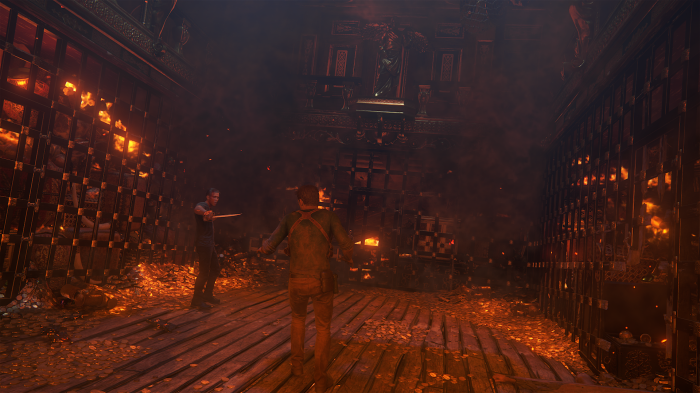I’m going to start things out by saying that I’m not about to talk about the difference between Sam and Nathan Drake, that difference has been made very clear in the story itself: Nathan has moved on from treasure hunting and Sam and hasn’t. What I am going to try to explain is the difference between Nathan Drake and (drumroll please…) Rafe Adler. Say whuuuut? Yes, I know it sounds strange, but hear me out. At the end of (Jesus’ version) the Prodigal Son, the younger son, having realized his wrongdoing, returns home to his father, and the father throws a big feast in honor of his son’s return. However, the story doesn’t end there as the older brother, the one who stayed with the father through all this time, indignantly refuses to join in the festivities.
 That part of the story is where I want to draw the parallels. The older son has worked for everything he’s earned, and his father hasn’t done anything to show his appreciation. Similarly, Rafe has worked for fifteen-plus years to find Captain Avery’s treasure, and so in the final scene of Uncharted 4, it kind of makes sense that he’s upset about Nathan showing up, even though by then it’s apparent that nobody’s going to go home with any treasure, not to mention that Nathan was just there to save his brother Sam. But all that doesn’t matter as Rafe throws one heck of a tantrum, going after Nathan with a cutlass while complaining about Nathan (seemingly) accomplishing so much more than he has even though he’s worked harder. He worked for this, and so dadgummit he deserves it!
That part of the story is where I want to draw the parallels. The older son has worked for everything he’s earned, and his father hasn’t done anything to show his appreciation. Similarly, Rafe has worked for fifteen-plus years to find Captain Avery’s treasure, and so in the final scene of Uncharted 4, it kind of makes sense that he’s upset about Nathan showing up, even though by then it’s apparent that nobody’s going to go home with any treasure, not to mention that Nathan was just there to save his brother Sam. But all that doesn’t matter as Rafe throws one heck of a tantrum, going after Nathan with a cutlass while complaining about Nathan (seemingly) accomplishing so much more than he has even though he’s worked harder. He worked for this, and so dadgummit he deserves it!
And how does Nathan compare to the younger brother? Admittedly, this is where the metaphor starts losing its grip; Nathan Drake doesn’t exactly fit the apart of the prodigal son except in the loosest form, so here we go. I’d say Nathan Drake is kind of like the prodigal son in that he deviated from treasure hunting, came back, and turned out above par with Rafe.
So in the end, hopefully you can see some similarities between the two stories. Both Rafe Adler and the older brother were working hard, and then see the younger brother, or Nathan Drake in this case, coming back and after having deviated from the normal way of life, coming out on top. Both feel indignant, because in some way or another, both deserved what the ohter got.
So what do you think? Do you agree, disagree, maybe have some other points that I’m missing? Please let me know in the comments below!